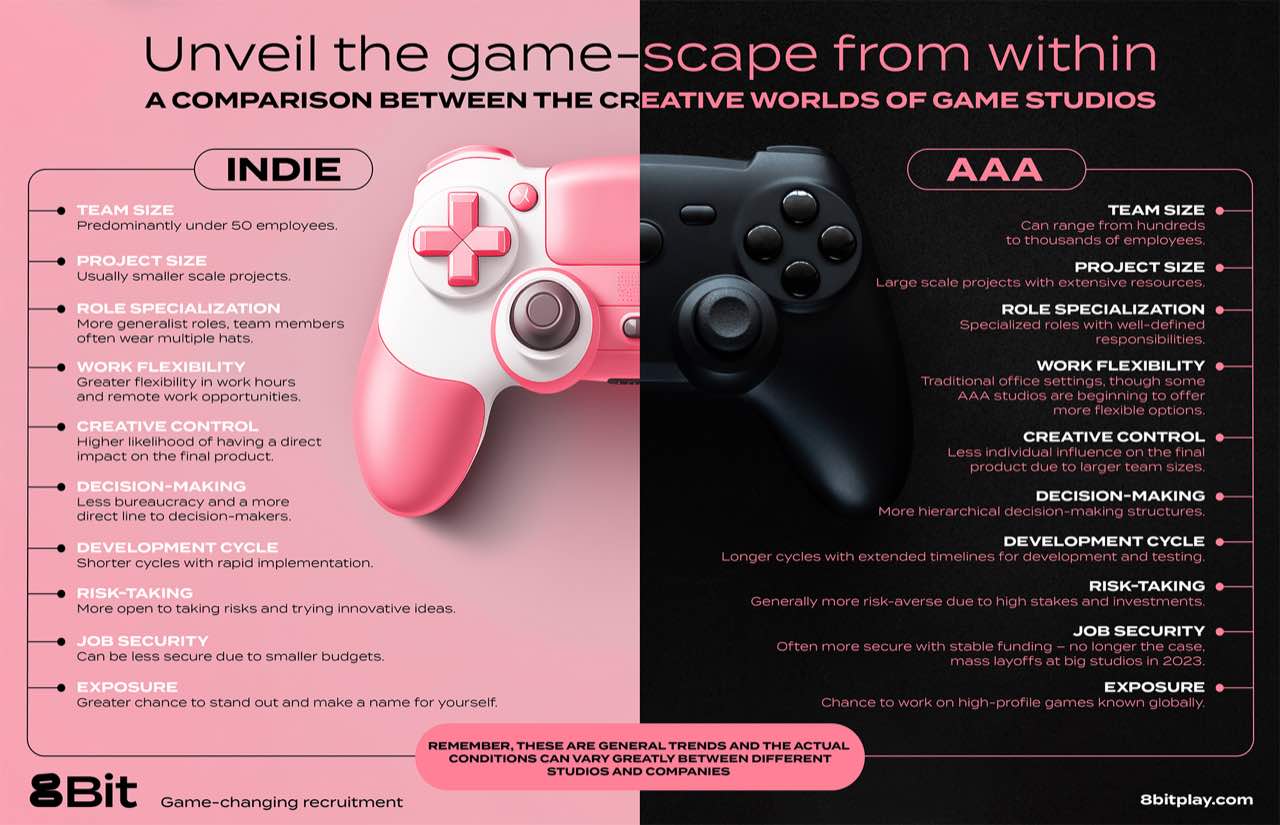
AAA vs Indie Game Studios: A Comparison of the Working Environment
See similar blog posts

In the ever-evolving domain of game development, the “AAA vs Indie” debate often arises when considering where to establish or progress a career. The landscape is dominated by these two entities – AAA and Indie game studios, each offering distinct working experiences and opportunities. Today, we take a deep dive into the creative worlds of AAA vs Indie studios, comparing them on several key aspects from an employee’s perspective. Remember, these are general trends, and actual conditions can significantly differ across studios and companies.
What is AAA studio?
AAA (Triple-A) studio is often considered to be the powerhouse of the gaming industry. These studios are typically equipped with large, specialized teams and substantial financial backing. They’re known for producing high-budget games with extensive resources, offering state-of-the-art graphics, immersive gameplay, and compelling storytelling. A AAA studio usually works on multiple new games simultaneously, with the capacity to produce large-scale, globally known titles.
What is an indie studio?
On the other side of the spectrum, an indie studio is typically characterized as a smaller, independent team of game developers that operates without the financial backing of a larger, mainstream video game publisher. However, the term ‘indie’ has become fluid and a little elusive in the modern gaming landscape. The reality can be more nuanced, complex, and even paradoxical. As the industry evolves, so does the dialogue around these definitions. To keep the conversation simple yet meaningful in our comparison, we’ve adopted a somewhat flattened definition of these terms, recognizing the inherent fluidity and variation in the current game development landscape.
Team Size
The “AAA vs Indie” distinction starts with team size. Indie studios predominantly consist of fewer than 50 employees, cultivating an intimate, collaborative environment. In contrast, AAA game studios can house from hundreds to thousands of employees, offering an opportunity to interact with a wide array of professionals.
Project Size
Let’s face it, project size matters. Indie studios tend to focus on smaller scale projects, providing hands-on experience in many areas of game development. Conversely, AAA studios, brimming with resources, tackle large-scale projects that impact the global gaming scene.
Role Specialization
Role specialization differs significantly between Indie and AAA. Indie studios typically offer more generalist roles, with team members often wearing multiple hats – an exciting prospect for broadening one’s skill set. AAA studios, in contrast, provide specialized roles with well-defined responsibilities, encouraging in-depth expertise in a particular area.
That is something that we elaborate on in our Gamedev Insights podcast. Watch the episode with Hernan Lopez, veteran indie game designer from Epic Llama!
Work Flexibility
When considering AAA vs Indie in terms of work flexibility, Indie studios often have the upper hand. They usually offer greater flexibility in work hours and remote work opportunities. Traditional AAA studios are more office-bound, but some are beginning to offer more flexible options, adapting to modern work trends.
Creative Control
Creative control is another crucial point in the “AAA vs Indie” debate. Indie studios, due to their smaller teams, often allow individuals to significantly influence the final product. In AAA studios, individual influence may be less due to larger teams, but the experience of contributing to high-profile projects is a compelling reward.
Decision-Making
In Indie studios, decision-making often bypasses bureaucracy, providing a more direct line to decision-makers. AAA studios usually have more hierarchical structures that may slow down the decision-making process.
Development Cycle
The differences also extend to the development cycle. Indie studios typically have shorter cycles with quick implementation, offering a fast-paced work environment. In contrast, AAA studios generally have longer cycles, with extended timelines matching their large-scale projects.
An interesting perspective was brought to the table by one of our LinkedIn followers, Mariusz Szczepanik, a Unity Developer, who sees the number of games a studio works on in the same time – as a way to distinct between Indie and AAA: “I’d say, in most cases, it’s about how many new games a studio is actively working on. 1-2? Indie. 3-5? AA, indie+, or something like that. >5? AAA. This way, it’s about the studio, not the game, which I think is a better way to classify it”.
Risk-Taking
The “AAA vs Indie” dichotomy also reveals a difference in appetite for risk. Indie studios are typically more open to taking risks and innovating, leading to the creation of unique games. AAA studios, with high stakes and significant investments, are generally more risk-averse.
Job Security
Historically, AAA studios were seen to provide more job security due to stable funding. However, mass layoffs in 2023 have blurred the “AAA vs Indie” lines. Indie studios, with their smaller budgets, have traditionally been perceived as less secure, but the burgeoning indie scene is challenging this notion.
Exposure
In terms of exposure, the “AAA vs Indie” debate gets interesting. Indie studios offer a greater chance to stand out and make a name for yourself. On the other hand, AAA studios allow you to contribute to high-profile, globally known games, adding substantial weight to your portfolio.

Choosing your path in the game development landscape is a balancing act between professional goals, creative aspirations, and personal needs. Whether you’re leaning towards the Indie or the AAA side, each presents its unique challenges and opportunities. Your ideal studio could lie anywhere on this spectrum, so keep exploring, learning, and game on!